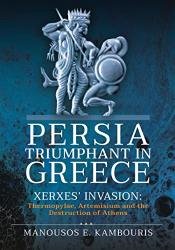Persia Triumphant in Greece: Xerxes' Invasion: Thermopylae, Artemisium and the Destruction of Athens
- Добавил: literator
- Дата: 5-10-2022, 14:50
- Комментариев: 0
 Название: Persia Triumphant in Greece: Xerxes' Invasion: Thermopylae, Artemisium and the Destruction of Athens
Название: Persia Triumphant in Greece: Xerxes' Invasion: Thermopylae, Artemisium and the Destruction of AthensАвтор: Manousos E Kambouris
Издательство: Pen and Sword Military
Год: 2022
Страниц: 241
Язык: английский
Формат: pdf (true)
Размер: 24.1 MB
This is the epic story of the Great Persian War of 481-479 BC, the major land and sea Persian invasion of Greece under Xerxes. Starting from the Persian decision to avenge the outrage caused to imperial prestige by the battle of Marathon, this book details the policy, diplomacy and religion as they intermingle with matters of strategy and tactics. It includes detailed coverage of the legendary Battle of Thermopylae, immortalized in literature and film as the ultimate defiant last stand. There is similarly in-depth coverage, in terms of events, tactics, methods and intentions, afforded to the relatively unknown sea battles off Cape Artemisium, only recently dramatized for the Big Screen; a naval engagement that primed the Battle of Salamis. Special attention has been paid to the events following these two battles, leading to the bloody conquest of Athens and the implementation of vengeance by the Persian Empire, which for a brief time stood triumphant, victorious and awesome as never before, but also sowed the seeds of eventual defeat.
Once it was decided that the campaign was to develop by land, followed by the fleet for mutual support (both in terms of logistics and operational combinations), a set of constants seemed undeniable. The concept had been tested time and again: it was successfully employed by Cambyses against Egypt (Her III.19,3; Holland 2005) and by Artaphrenes against the rebels in Ionia in 493 BC (Her VI.31 & 33). Its faulty application resulted in the disaster of Darius I in Scythia, while Mardonius was forced to abort once his fleet had been destroyed (Her VI.45,2). The only exception to the rule was the Persian Reconquista of Cyprus (Her V.116) by the army of Artybius (Her V.108), who fell early in the first battle (Her V.113), but the campaign had been victorious despite the defeat of the supporting fleet (Her V.112,1).
Common sense dictated that at least an army (group) or, at any rate, a powerful land force, was to shadow from the coast the moves of the fleet. The fleet had to make daily calls to the land if not for watering, definitely for rest. The massive crews of rowers could not be accommodated onboard, unlike other more spacious vessels of other ages. Thus, these predictable calls were windows of vulnerability, with the land army providing protection in enemy shoreline and securing watering. This was more or less how the Greeks perceived the vulnerability of the Persian fleet. At the same time, the fleet kept the army supplied and would assist by amphibious flanking or enveloping the enemy positions, should the land force be intercepted and pinned or repulsed.
Скачать Persia Triumphant in Greece: Xerxes' Invasion
[related-news] [/related-news]
Внимание
Уважаемый посетитель, Вы зашли на сайт как незарегистрированный пользователь.
Мы рекомендуем Вам зарегистрироваться либо войти на сайт под своим именем.
Уважаемый посетитель, Вы зашли на сайт как незарегистрированный пользователь.
Мы рекомендуем Вам зарегистрироваться либо войти на сайт под своим именем.
